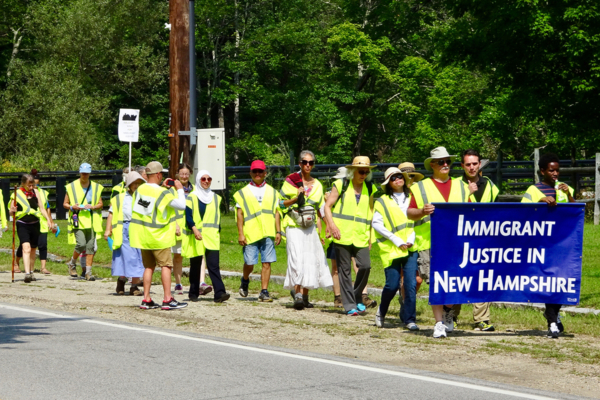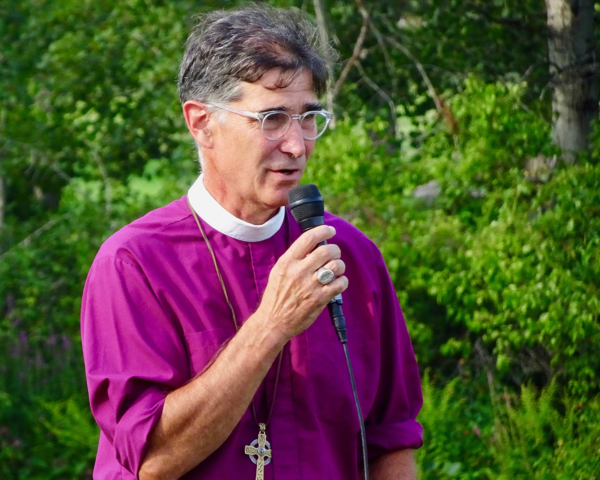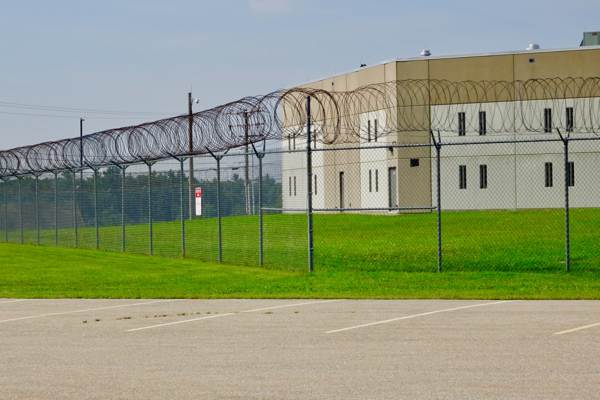Solidarity Walk in New Hampshire helps energize state’s immigrant justice effortsPosted Aug 27, 2018 |
|

Participants in the Solidarity Walk for Immigrant Justice make their way through New Hampshire, from Manchester to Dover, tracing the path immigrants take when they are detained by federal authorities and held in the Strafford County jail. Photo: David Price
[Episcopal News Service] Episcopalians and their faith and community partners in a New Hampshire immigrant justice movement hope to build on the momentum gained during last week’s Solidarity Walk and a concluding prayer vigil held outside the county jail where federal immigrant detainees are held.
The four-day trek covered about 40 miles from Manchester to Dover, with several dozen people joining at least one of the segments along the way. On the final day, Aug. 25, Diocese of New Hampshire Bishop Rob Hirschfeld was among the speakers who addressed a crowd of about 100 people gathered on the lawn in front of the Strafford County Jail.
“Jesus said to have compassion for those who are in prison,” Hirschfeld told Episcopal News Service by phone on Aug. 27, recapping the experience. He compared it to his experience in July when hundreds of Episcopalians who were attending the 79th General Convention in Austin, Texas, gathered for a prayer service outside an immigrant detention facility in the area.

New Hampshire Bishop Rob Hirschfeld speaks Aug. 25 outside the Strafford County jail in Dover during the prayer vigil that concluded the Solidarity Walk for Immigrant Justice. Photo: David Price
“What I remember about both [vigils] is the Spanish sentence ‘te vemos’ – ‘we see you,’” Hirschfeld said. “The walk in New Hampshire was a way of our saying, ‘We see you, we value you, we see your plight.’ And I would also say we need to see ourselves and what this country is becoming, which is increasingly callous, brutal, insensitive to the suffering of our neighbors.”
The New Hampshire Council of Churches was one of the lead organizers of the Solidarity Walk for Immigrant Justice, which sought to raise awareness of the plight of immigrants in the state at a time when much of the focus has been on conflict along the Mexican border, especially under the Trump administration’s “zero tolerance” policy toward immigrants crossing into the United States.
As Hirschfeld mentioned, another goal was to offer support for those who have been detained or who face deportation, said the Rev. Jason Wells, an Episcopal priest who serves as executive director of the council. He also noted that the several days spent on the road have strengthened the state’s community of immigrant supporters.
“There is a real shared experience, a real shared struggle in a way, to make the walk, and it brought us closer together,” he said. That solidarity is expected to carry through to the weekly prayer vigils held outside the offices of U.S. Immigration and Customs Enforcement in Manchester, with the next one scheduled for Aug. 28.
The Solidarity Walk kicked off with about 50 walkers, Wells said. About 25 people participated on each of the following two days, and participation rose to about 75 on the final day. Wells walked some of the segments and served as a support vehicle driver on other segments.
The walkers were met by a mix of reactions from the public. Negative responses ranged from drivers giving them thumbs down signs – or a certain other crude hand gesture – to people shouting, “build the wall,” a reference to President Donald Trump’s signature campaign promise of a border wall.
But many people gave honks of support, and walkers were greeted by other “pieces of solidarity,” Wells said. They were joined on one segment by a Christian leader from the local Indonesian immigrant community, who was stopped along the way by an Indonesian Muslim leader offering words of support. At another point, U.S. Sen. Jeanne Shaheen visited with the walkers and wished them well.
A family from El Salvador joined the walk for some of the segments, and their stories of fleeing to the United States and seeking asylum filled the walkers’ conversations with a sense of purpose as friendships were formed around a common cause, said the Rev. Gail Avery, the Diocese of New Hampshire’s canon for transition and community engagement.
“It was amazing to see the support that we did get along the way,” said Avery, who participated on the first three days. “We had people that came out of their houses, offered us water, offered us a bathroom break, which was amazing.”
Avery’s commitment to working for immigrant justice has been strengthened by the experience of passing through a checkpoint that the Border Patrol had set up on a highway through her state. As a white woman driving alone, she was waved through without delay, but she suspects that if she had been traveling with her daughter-in-law – a Salvadoran immigrant – authorities would not have let her pass without stopping her.
“I just believe that we are a land of liberty and freedom, and we’re a land of immigrants, a nation of immigrants, and we have just lost sight of it,” she said.

The Strafford County jail, one of six facilities in New England holding immigration detainees for the federal government. Photo: David Price
The Episcopal Church’s support for immigrants, including those facing deportation, was underscored last month by the 79th General Convention, which passed multiple resolutions on immigration issues.
The church and other faith communities are not taking political stances but rather pushing back against “the tyranny of ideology over humanity,” Hirschfeld said. Respecting the dignity of all humans is part of Episcopalians’ baptismal covenant, he said, and that message will live on in the ongoing prayer vigils held in Manchester when immigrants are called to check in with federal authorities.
The only thing that might change now at the vigils is the footwear, Wells said.
“We’ll see if people need to buy some new shoes before they go,” he said, after walking so many miles last week.
– David Paulsen is an editor and reporter for the Episcopal News Service. He can be reached at dpaulsen@episcopalchurch.org.

Social Menu